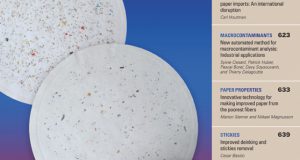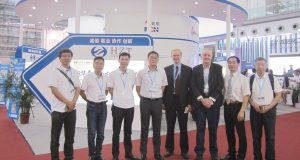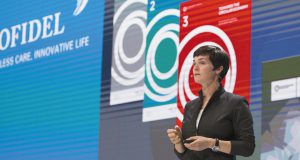
Tissue products have a long association with good health and quality of life. So it’s no surprise that for one of Europe’s largest tissue companies the idea of sustainability extends beyond production and distribution to include long-term social and environmental advantages for stakeholders at every stage of the value chain.
The Sofidel Group is headquartered in Porcari, in the Italian province of Lucca. The company was founded in 1966 and has more than 5,5000 employees. With annual production capacity topping one million metric tons, it holds second place in Europe and sixth place worldwide in the tissue sector, and is a leading producer of tissue for hygienic and domestic use; its best-known brand is Regina.
In its value chain, Sofidel places strategic importance on sustainability for growth and development; its goals are to minimize its own environmental impact and maximize the social benefits. Sofidel is the first Italian manufacturer—and the world’s first from the tissue sector—to join the WWF Climate Savers project, aimed at market-leading businesses with regard to the low-carbon economy, which sets particularly ambitious objectives.
To date, Sofidel has reduced its direct emissions of CO2 into the atmosphere by 17.8 percent (carbon intensity, from 2009 to 2015), thanks to investments in energy efficiency, the use of cogeneration plants, and the use of renewable energy sources. Another action area has been the sourcing of cellulose from certified and managed sources (FSC, PEFC, SFI), which has reached a level of 99.7 percent.
SUSTAINABILITY AS BUSINESS LEVERAGE
The importance of sustainability as a leverage for business and cultural growth in the Sofidel Group’s strategic approach is manifested in the company’s Sustainability Decalogue. This policy highlights the 10 main benefits expected from the application of strict business policies of social responsibility—in terms of increased economic and productive efficiency, access to financial markets, and reputation.
 As part of this approach, the company measures its own growth not only in terms of turnover, marginality, volume, and geographic coverage, but also by considering social return in terms of well-being for the community. By 2020, Sofidel hopes to:
As part of this approach, the company measures its own growth not only in terms of turnover, marginality, volume, and geographic coverage, but also by considering social return in terms of well-being for the community. By 2020, Sofidel hopes to:
• Reduce its direct emissions of CO2 by 23 percent per metric ton of paper produced (from 2009 levels.)
• Limit indirect emissions of CO2, as caused by third parties within the value chain by 13 percent per ton of paper produced (compared to 2010 levels.)
• Reach 8 percent of energy from renewable sources on the quantity of fuel consumed annually.

Sustainability for Sofidel also means social sustainability. In addition to its collaboration with the WWF, it has developed several collaborations with associations and NGOs. Partnerships have been established with the UN Global Compact, the Sodalitas Foundation, EU-OSHA (European Agency for Health and Safety at Work), and the Giuseppe Lazzareschi Foundation. Sofidel has also established collaborations through its own brands and products in several countries. These include: Nicky brand with the Telethon Foundation in Italy; Nicky with the Woodland Trust in Great Britain; Nicky with Jack & Jill Children’s Foundation in the Republic of Ireland; Papernet with Médecins Sans Frontières; and Cosynel with Sos Children’s Villages in Belgium.
As stated by Sofidel Group CEO Luigi Lazzareschi, “Building a positive future for companies—as well as for people and the whole world—means moving toward an ever more widespread and shared commitment. Each of us, in our different fields and depending on our different roles, must take on new and broader responsibilities.”
Sofidel Launches Suppliers Sustainability Award
In its effort to “encourage, disseminate, and promote environmental and social sustainability best practices and improvement actions among suppliers,” Sofidel has created its Suppliers Sustainability Award. Suppliers who have  excelled in projects associated with environmental and social sustainability were honored in November, 2016, in Lucca, Italy, for the award’s first presentations. The award is the first of its kind in the tissue sector.
excelled in projects associated with environmental and social sustainability were honored in November, 2016, in Lucca, Italy, for the award’s first presentations. The award is the first of its kind in the tissue sector.
More than 300 of the group’s suppliers—from Italy and around the world—participated in the initiative. They were assessed using the “TenP – Sustainable Supply Chain Self-Assessment Platform” created and promoted by the Global Compact Network Italia (GCNI) Foundation, of which the Sofidel Group is a founding member and sponsor. Built on the UN Global Compact’s Ten Principles (“TenP”), the platform takes into account human rights, working conditions, the environment, and the fight against corruption, with the aim of identifying common challenges and solutions to improve supply chain sustainability. The three award categories, and the 2016 winners, are:
• Best Supplier – the company that has achieved the highest score on the TenP platform:
–
Pulp Producers Category:
SCA Graphic Sundsvall AB
–
Procurement & Purchasing Category: Henkel
–
Logistics Services Category:
Chep Italia
–
Marketing & Sales Category:
Vizeum Deutschland GmbH
• Best Improver – the company that has obtained the best improvement in its results by setting up new environmental and social sustainability procedures:
–
Pulp Producers Category: Arauco
–
Procurement & Purchasing Category: TMC
–
Logistics Services Category:
JC Trans (UK) Ltd
–
Marketing & Sales Category: Vizeum Deutschland GmbH
• Best Sustainable Project – the company that has implemented a particularly important environmental and social sustainability initiative:
–
Large Companies Category:
Metsa Fibre Oy
–
Medium Companies Category:
Imball Center srl
–
Small Companies Category:
Kinect Energy
Sofidel Group CEO Luigi Lazzareschi, speaking at the 2016 Sustainability Award ceremony.Sofidel Group’s strategic approach, as stated in its Sustainability Decalogue.
Sofidel is a WWF Climate Savers member.
Sofidel Group headquarters in Porcari, Lucca, Italy.
 Paper 360
Paper 360


